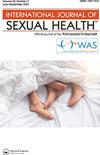Blued安全吗?性别、风险和污名在中国同性恋社会应用的定性探索
IF 2.1
4区 医学
Q2 PSYCHOLOGY, CLINICAL
引用次数: 1
摘要
【摘要】简介:随着科技的发展,手机交友软件应运而生,如中国的Blued,成为艾滋病时代男同性恋者的一个新的风险领域。用户使用社交应用在线聊天和离线约会,以满足欲望或性行为,但艾滋病的风险笼罩在使用应用的整个过程中。方法:邀请19名受访者参与本研究,其中包括正在使用或曾经使用Blued的男同性恋者。半结构化访谈的内容主要集中在同性恋社交应用与艾滋病风险之间的关系上。结果:研究发现Blued与性、风险和耻辱交织在一起。Blued是由于性意图和性行为而被性化的。基于社会经济因素,Blued及其用户的风险也存在性别分层。用户在追求性行为的同时,又会在污名化的背景下担心潜在的风险。结论:Blued在刺激性满足和促进性行为的过程中被性化了。Blued的经历是性别分层的一个例子,是基于应用用户和应用用途的欲望结构。此外,社会对男男性行为的耻辱感被转移到Blued身上,Blued背负着“AIDS-Blued”的耻辱感,带有hiv相关和同性恋的双重耻辱感。然而,随着Blued在公共卫生领域的授权批准,Blued可以在艾滋病毒/艾滋病的预防和控制中发挥重要作用。作者感谢所有参与者对研究的贡献,并感谢匿名审稿人对文章的周到和建设性意见。注1:该报告可在:https://weekly.caixin.com/2019-01-04/101366501.html.2检索自:https://williamsinstitute.law.ucla.edu/wp-content/uploads/Global-Acceptance-Index-LGBTI-Nov-2021.pdf3用户通常会收到Blued的信息,由敏感的文字和图片触发“健康约会,预防艾滋病,保护隐私,避免财产损失”事实上,我遵循了道德标准,他们都不是我的受访者的真实姓氏,以避免任何泄露检索自:https://weekly.caixin.com/2019-01-04/101366501.html.Additional informationfunding作者报告没有与本文所述工作相关的资金。本文章由计算机程序翻译,如有差异,请以英文原文为准。
Safe on Blued? A Qualitative Exploration of Sex, Risk, and Stigma on a Gay Social Application in China
AbstractIntroduction: Mobile dating apps emerged with the development of technology, for example, Blued in China, becoming a new risk field for gay men in the AIDS era. Users use social apps to chat online and date offline to achieve the satisfaction of lust or sexual practice, but the risk of AID looms over the whole process of using apps. Methods: Nineteen interviewees were invited to participate in this study, which included gay men who were using or had used Blued. The content of the semi-structured interviews focused on the relationship between gay social apps and HIV risk. Results: The study finds Blued interweaved with sex, risk, and stigma. Blued is sexualized due to sexual intentions and practices. There is also a sexual stratification of risk with Blued and its users based on socioeconomic factors. Users experience a dilemma between pursuing sex while being concerned about latent risk within a context of stigmatization. Conclusions: Blued is sexualized in terms of the process of stimulating sexual gratification and facilitating sexual practices. The experience of Blued is an example of sexual stratification, and a structure of desire based on app users and app uses. Furthermore, the social stigma against men who have sex with men is transferred to Blued, which bears the stigma of “AIDS-Blued” with a dual stigma—HIV-related and homosexual stigma. However, with the authorized approval of Blued in public health, Blued could play an essential role in HIV/AIDS prevention and control.Keywords: BluedsexHIV/AIDSriskstigma NotesAcknowledgmentsThe author would like to thank all participants for their contributions to the study and thank the anonymous reviewers for their thoughtful and constructive comments on the article.Notes1 This report can be found at: https://weekly.caixin.com/2019-01-04/101366501.html.2 Retrived from: https://williamsinstitute.law.ucla.edu/wp-content/uploads/Global-Acceptance-Index-LGBTI-Nov-2021.pdf3 Users usually receive a message from Blued, saying “healthy dating, HIV prevention, keeping privacy, and avoiding property damage” triggered by sensitive words and pictures.4 In fact, I followed the ethical standards, and they were not real family names of my interviewees to avoid any disclosure.5 Retrived from: https://weekly.caixin.com/2019-01-04/101366501.html.Additional informationFundingThe author(s) reported there is no funding associated with the work featured in this article.
求助全文
通过发布文献求助,成功后即可免费获取论文全文。
去求助
来源期刊

International Journal of Sexual Health
Multiple-
CiteScore
3.00
自引率
20.00%
发文量
33
期刊介绍:
As the official journal of the World Association for Sexual Health, the International Journal of Sexual Health promotes sexual health as a state of physical, emotional, mental, and social well-being through a positive approach to sexuality and sexual rights. The journal publishes peer-reviewed scientific papers, editorials, and reviews, using quantitative and qualitative methods, descriptive and critical analysis, instrument development, surveys, and case studies to examine the essential elements of this broad concept. Leading experts from around the world present original work that covers a variety of disciplines, including sexology, biology, medicine, psychology, sociology, anthropology, history, and religion.
 求助内容:
求助内容: 应助结果提醒方式:
应助结果提醒方式:


